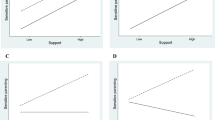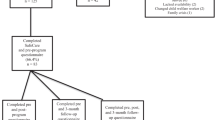Objective: Despite the high prevalence of maternal depression and its negative consequences for children, many pediatricians fail to identify this problem. Our goal was to determine whether simple questions about parenting competence and the adequacy of maternal social support might be useful to providers in determining which inner-city mothers are likely to be depressed. Methods: We surveyed a convenience sample of 279 English-speaking mothers of children 6 months to 3 years old prior to a routine visit at an urban, hospital-based general pediatrics clinic. The mothers self-completed the Psychiatric Symptom Index (PSI) and the Parenting Stress Index Sense of Competence subscale, and rated the adequacy of their social support, and provided health and sociodemographic data by face-to-face interview. Results: 41% of mothers had “high” PSI symptom levels and 22% had scores above a criterion that suggests major depressive disorder. In addition, 15% experienced high parenting stress (low competence) and 42% reported little or no social support. High distress was unrelated to a variety of sociodemographic risk factors, but significantly associated with a poor sense of parenting competence (Adj. OR = 3.3, 95% CI = 1.5, 7.0) and inadequate perceived social support (Adj. OR = 2.3, 95% CI = 1.2, 4.4), as well as with having health-related activity limitations (Adj. OR = 3.2, 95% CI = 1.1, 9.0). Conclusions: Negative ratings of parenting competence, low perceived social support, and presence of health-related activity restrictions can be useful markers of likely depression among inner-city mothers of young children. These factors are often assessed during routine pediatric visits and may be helpful to pediatricians in identifying mothers needing further evaluation or treatment by mental health specialists.
Similar content being viewed by others
REFERENCES
Hall LA, Williams CA, Greenberg RS. Supports, stressors, and depressive symptoms in low-income mothers of young children. Am J Public Health 1985;75:518–22.
Hall LA, Gurley DN, Sachs B, Kryscio RJ. Psychosocial predictors of maternal depressive symptoms, parenting attitudes, and child behavior in single-parent families. Nurs Res 1991;40:214–20.
Kahn RS, Wise PH, Finkelstein JA, Bernstein HH, Lowe JA, Homer CJ. The scope of unmet maternal needs in pediatric settings. Pediatrics 1999;3:576–81.
Kemper KJ, Babonis TR. Screening for maternal depression in pediatric clinics. AJDC 1992;146:876–8.
Lanzi RG, Pascoe JM, Keltner B, Ramey SL. Correlates of maternal depressive symptoms in a national Head Start program sample. Arch Pediatr Adolesc Med 1999;153:801–7.
Olson AL, DiBrigida LA. Depressive symptoms and work role satisfaction in mothers of toddlers. Pediatrics 1994;94:363–7.
Orr ST, James S. Maternal depression in an urban pediatric practice: Implications for healthcare delivery. Am J Public Health 1984;74:363–5.
Orr ST, James SA, Burns BJ, Thompson B. Chronic stressors and maternal depression: Implications for prevention. Am J Public Health 1989;79:1295–6.
Reis J. Correlates of depression according to maternal age. J Genet Psychol 1988;149:535–45.
Alpern L, Lyons-Ruth K. Preschool children at social risk: Chronicity and timing of maternal depressive symptoms and child behavior problems at school and at home. Dev Psychopathol 1993;5:371–87.
Beardslee WR, Bemporad J, Keller MB, Klerman GL. Children of parents with major affective disorder: A review. Am J Psychiatry 1983;140:825–32.
Coghill SR, Caplan HL, Alexandra H, Robson K, Kumar R. Impact of maternal postnatal depression on cognitive development of young children. Br Med J 1986;292:1165–7.
Cummings E, Davies P. Maternal depression and child development. J Child Psychol Psychiatry 1994;35:73–112.
Hammen C, Gordon D, Burge D, Adrian C, Jaenicke C, Hiroto D. Maternal affective disorders, illness, and stress: Risk for children's psychopathology. Am J Psychiatry 1987;144:736–41.
Leadbeater BJ, Bishop SJ. Predictors of behavior problems in preschool children of inner-city Afro-American and Puerto Rican adolescent mothers. Child Dev 1994;65:638–48.
Richman N. Depression in mothers of preschool children. J Child Psychol Psychiatr 1976;17:75–8.
Weissman MM, Gammon GD, John K, et al. Children of depressed parents: Increased psychopathology and early onset of major depression. Arch Gen Psychiatry 1987;44:847–53.
Weissman MM, John K, Merikangas KR, et al. Depressed parents and their children: General health, social, and psychiatric problems. Am J Dis Child 1986;140:801–5.
Weissman MM, Prusoff BA, Gammon GD, Merikangas KR, Leckman JF, Kidd KK. Psychopathology in the children (ages 6–18) of depressed and normal parents. J Am Acad Child Psychiatry 1984;23:78–84.
Schor E. Converging trends in family research and pediatrics: Recent findings from the American Academy of Pediatrics Task Force on the Family. Pediatrics 2003;111:1572–87.
McGrath E, Keita GP, Strickland BR, Russo NF. Women and Depression: Risk Factors and Treatment Issues. Washington, DC: American Psychological Association, 1990.
Green M, Palfray J, editors. Bright Futures. Guidelines for Health Supervision of Infants, Children, and Adolescents, 2nd ed., rev. Arlington, VA: National Center for Education in Maternal and Child Health, 2002.
Murray CJL, Lopez AD, editors. The Global Burden of Disease. Cambridge, MA: Harvard University Press, 1996.
Heneghan AM, Silver EJ, Bauman LJ, Stein REK. Are Pediatricians and Mothers Willing to Discuss Maternal Mental Health Issues in a Primary Care Clinic? Paper presented at the 39th Annual Meeting of the Ambulatory Pediatric Association, San Francisco, CA, May 4, 1999.
Cheng TL, Savageau JA, Bigelow C, Charney E, Kumar S, DeWitt TG. Assessing mothers’ attitudes about the physician's role in child health promotion. Am J Public Health 1996;86:1809–12.
Zuckerman BS, Beardslee WR. Maternal depression: A concern for pediatricians. Pediatrics 1987;79:110–7.
Jellinek M, Patel BP, Froehle MC, editors. Bright Futures in Practice: Mental Health—Volume 1. Practice Guide. Arlington, VA: National Center for Education in Maternal and Child Health, 2002.
Heneghan AM, Silver EJ, Bauman LJ, Stein REK. Do pediatricians recognize mothers with depressive symptoms? Pediatrics 2000;106:1367–73.
Koeske GF, Koeske RD. The buffering effect of social support on parental stress. Am J Orthopsychiatr 1990;60:440–51.
Frankel KA, Harmon RJ. Depressed mothers: They don't always look as bad as they feel. J Am Acad Child Adolesc Psychiatry 1996;35:289–98.
Cohen S, Wills TA. Stress, social support, and the buffering hypothesis. Psychol Bull 1985;98:310–57.
Turner RJ, Turner JB. Social integration and support. In: Aneshensel CS, Phelan JC, (Eds.) Handbook of the Sociology of Mental Health. New York: Kluwer Academic/Plenum, 1999:301–19.
Heneghan AM, Silver EJ, Westbrook L, Bauman LJ, Stein REK. Depressive symptoms in mothers with young children: Who is at risk? Pediatrics 1998;102:1394–1400.
Ilfeld FW. Further validation of a psychiatric symptom index in a normal population. Psychol Rep 1976;39:1215–28.
Stein REK, Jessop DJ. Does pediatric homecare make a difference for children with chronic illness? Findings from the Pediatric Ambulatory Care Treatment Study. Pediatrics 1984;73:848–53.
Silver EJ, Ireys HT, Bauman LJ, Stein REK. Psychosocial outcomes of a support intervention in mothers of children with ongoing health conditions: The Parent-to Parent Network. J Community Psychol 1997;25:249–64.
Bauman LJ. Mental health of inner-city mothers of children with chronic conditions. Arch Pediatr Adolesc Med 1994;48:37. Abstract.
Abidin RR. Parenting Stress Index—-Manual. Charlottesville, VA: Pediatric Psychology, 1986.
Loyd BH, Abidin RR. Revision of the Parenting Stress Index. J Pediatr Psychol 1985;10:169–77.
Weissman MM, Bruce ML, Leaf PJ, et al. Affective disorders. In: Robins LN, Regier DA, (Eds.) Psychiatric Disorders in America: The Epidemiological Catchment Area Study. New York: Free, 1991.
Regier DA, Boyd JH, Burke JD, et al. One-month prevalence of mental disorders in the United States. Arch Gen Psychiatry 1988;45:977–86.
Belle D. Poverty and women's mental health. Am Psychol 1990;45:385–9.
Heneghan AM, Silver EJ. How Do Attitudes Toward Psychosocial Issues in Primary Care Relate to Provider Characteristics? Poster symposium presentation at the 39th Annual Meeting of the Ambulatory Pediatric Association, San Francisco, CA, May 1, 1999.
Okun A, Stein REK, Bauman LJ, Silver EJ. Content validity of the Psychiatric Symptom Index, CES-Depression Scale, and State-Trait Anxiety Inventory from the perspective of DSM-IV. Psychol Rep 1996;79:1059–69.
ACKNOWLEDGMENTS
Portions of this paper were presented at the 38th Annual Meeting of the Ambulatory Pediatric Association, New Orleans, LA, May 4, 1998. We gratefully acknowledge the cooperation of the New York City Health and Hospitals Corporation and Jacobi Medical Center. We also thank students from the Albert Einstein College of Medicine and the Health Research Training Program of the New York City Department of Health for their assistance in data collection, Lauren E. Westbrook, PhD for contributing to earlier work that led to this investigation, and the participating families for their help.
Author information
Authors and Affiliations
Corresponding author
Rights and permissions
About this article
Cite this article
Silver, E.J., Heneghan, A.M., Bauman, L.J. et al. The Relationship of Depressive Symptoms to Parenting Competence and Social Support in Inner-City Mothers of Young Children. Matern Child Health J 10, 105–112 (2006). https://doi.org/10.1007/s10995-005-0024-4
Published:
Issue Date:
DOI: https://doi.org/10.1007/s10995-005-0024-4




